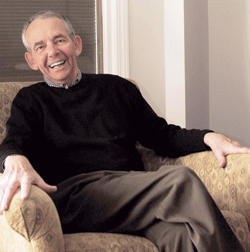
I was working as a janitor at Orchestra Hall, while I attended Loyola University in Chicago between 1970-1974. They were the Solti years. I soaked in the greatest and most soul stirring music by the most disciplined and finest craftsmen in the musical arts.
Whenever the symphony rehearsed or performed the maintenance staff was like the crew of submarine being pinged by an enemy destroyer. Silent running. No vacuums; no noise; no grab-assing! Though we were all union members of Elevator Operators, Janitors, Electricians, Painters, Stage Hands and Stationary Engineers unions, violating the silence could get one tossed from the job.
During those times and many others I studied.
Like the music I soaked in Ruskin, Chaucer, Bacon, Wordsworth, Bellow, Bashevis Singer, O'Connor, Tolstoy and Turgenev. The professors at Loyola, Jesuit and Lay shaped the study to good effect. One of the more difficult authors in the entire canon of English studies, for me anyway was Thomas Carlyle and of his works Sartor Resartus the most difficult.
The work originally was a series of offerings found in Fraser's Magazine that purported to be philosophical commentaries on the life and works of Diogenes Teufelsdröckh whose development of the philosophy of clothes was to have been a very big deal. It wasn't and that was the joke. Carlyle being a lowland Scot was about as funny as a Quaker on Valium.
What I took away from the work was the very real understanding that literary artists could be absolute drips, crabs, bigots, bores and humbugs. I would wish to spend time with the living breathing Thomas Carlyle as I would with Studs Terkel. Both gents are asleep with Kings and Counsellors and in a very good place - for all of us.
I love to read and I like to read people who remind me of my better professors - the men and women who soaked themselves in their disciplines. While I was a high school teacher, I worked to be a better teacher by reading and subscribing to the better literary journals. One of the best was American Scholar edited by America's Montaigne -Joseph Epstein. it was in the pages of American Scholar where I discovered Gary Saul Morson who defended literary criticism fro the waves of fashionable idiots like Noam Chomsky. Morson, like Epstein taught at Northwestern, is a brilliant Tolstoy scholar. I am a Thackeray geek; Tolstoy was as well; therefore the connection of interest.
Morson and Editor essayist Epstein are fierce defenders of the humanities and the unifying purpose of art and politics. They confound the Marxists and Semiotic Totalitarians who have dominated literary discourse and academic studies for far too long.
The American Scholar is no more, but Joseph Epstein whirls his pen dervishly in defence of the literary arts.
Joseph Epstein is the "Retailor of the tailors" to use Carlyle's translation for his dense satire. I subscribe to the purportedly Jewish magazine Commentary, as much because Joseph Epstein proses there regularly as anything else.
Last month, Epstein took a look at the literary critic Alfred Kazin, whom, like Noam Chomsky - the Rodney Dangerfield of the Humorless, everyone worships, but no one reads. Here is a Fun Size bite of Joseph Epstein:
The writers Kazin most strongly admired were William Blake and Ralph Waldo Emerson and Simone Weil and Jean-Paul Sartre, advocates of life intensely lived but with an emphatically preacherly vein added. Kazin resembled them all in never being in doubt about his own superior rectitude. He thought himself an American Orwell, his heart always in the right place and keen to take up a position in what used to be known as “the third camp,” scorning, that is, Communists and anti-Communists alike. “I have never recovered from the thirties or wanted to,” he wrote in Writing Was Everything. “A son of the immigrant working class whose parents were tortured by poverty, I hardly needed the depression to be suspicious of moneyed power, or to see that in this society money is the first measure of all things and the only measure of many—or to learn for myself that there is no way in America of being honorably poor.”
Kazin preferred to think himself a writer rather than a critic. But in his noncritical writing, without a book or author to intervene between him and the reader, his personality comes through and putrefies everything with his self-righteous sourness. Like Emerson and Thoreau, he was a blatantly self-approving writer, and the strong element of confidence about his own virtue spoils much of what he wrote apart from his criticism, including his autobiographies.
The first of these, A Walker in the City, which in his Journals he refers to as “my Walker poem” and “a fable of youth, sweetness, and search,” today feels overwrought, overwritten, straining for lyricism: “Somewhere below they were roasting coffee, handling spices—the odor was in the pillars, in the battered wooden planks of the promenade beneath my feet, in the blackness upwelling from the river.” Lots of such passages occur in a book that often reads as if written by Walt Whitman bloated on matzah brei. The other two volumes of Kazin’s autobiography are blighted by Kazin’s need to score off enemies, left and right, real and imagined. Remove these portions about his enemies and the books go up in smoke.
( emphasis my own! Matzah Brei - is Jewish Scrapple sans pork)
You can soak up Joseph Epstein by clicking my post title. If Studs Terkel is a "Chicago Treasure" he is surely in his proper place, now; Joseph Epstein is readily available. Thank God!






